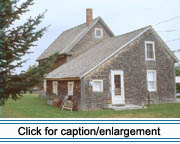|
Unlike other properties described in this report, the Pelletier-Marquis
House is not located on a "treaty lot" or a "river lot." Instead, the
lot on Long Lake is on land locally known as "les concessions."
In an attempt to encourage railroad development, the Maine state government
issued a land grant of one million acres to the European & North American
Railway in 1869. This grant created conflicting claims, and the Commission
on Claims of Settlers on Proprietors' Lands in the County of Aroostook
was established in 1873. The commission issued a report in 1874. Among
the claims listed in the report is one made by André Pelletier of Township
18, Range 4. The report indicates that Pelletier "took up" the property
in two pieces in 1853 and 1871. In the year of the report, the first parcel
was improved with a house, barn, and stable. While the original state
grant for this lot has not been located, the oldest portion of the Pelletier-Marquis
House is believed to date from 1853 (Dubay 1976).
In 1875, André Pelletier received an eviction notice from  bond
holders for the European & North American Railway who sought to recover
their losses by attaching the railroad's property when the railroad defaulted
on its notes. Because the railroad's claims conflicted with settlers'
claims, Pelletier and 127 rear-lot farmers received eviction notices.
Documentary evidence indicates that Pelletier continued to occupy his
homestead despite the challenge to his ownership. bond
holders for the European & North American Railway who sought to recover
their losses by attaching the railroad's property when the railroad defaulted
on its notes. Because the railroad's claims conflicted with settlers'
claims, Pelletier and 127 rear-lot farmers received eviction notices.
Documentary evidence indicates that Pelletier continued to occupy his
homestead despite the challenge to his ownership.
André Pelletier, whose family can be traced back eight generations in
Québec, was the son of Alexandre Pelletier and Angelique Lebel, who had
married at Saint-Louis de Kamouraska in 1814. André married Scholastique
Chamberland at St. Luce Church in Frenchville on November 23, 1847. They
had 12 children. Later owners of the Pelletier-Marquis House included
two families living in it at the same time. While the Marquis family occupied
half of the house, the Sylvain, Chassé, and Picard families each
in turn occupied the other half. Consequently, the succession lines became
extremely complex.
|
 |

